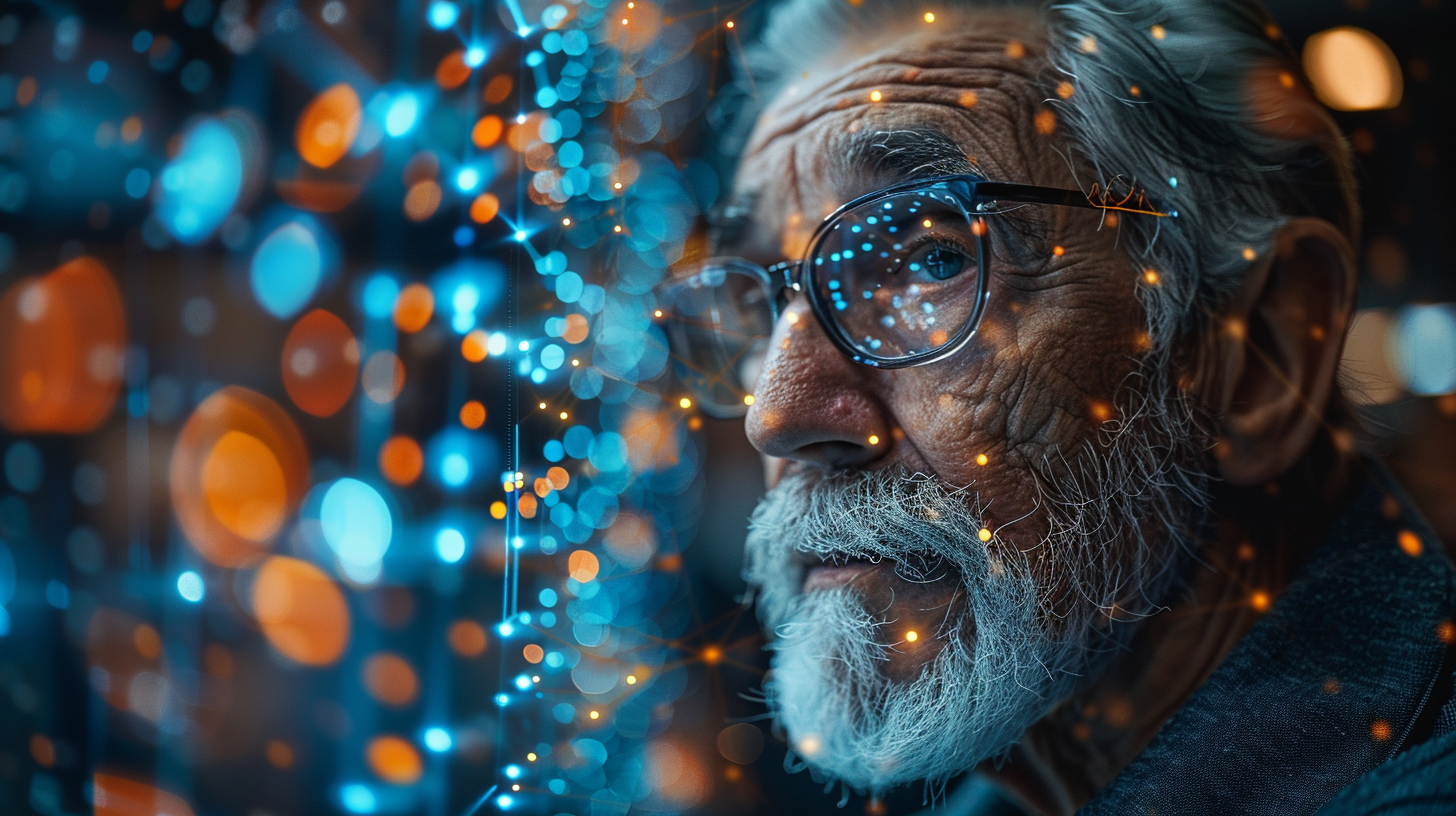Empowering Independence: AI Solutions for Seniors in a Golden Age
2024-05-23 | By Orcam Staff

The world's population is aging rapidly. By 2050, the United Nations estimates that one in six people will be over 65. This demographic shift presents both challenges and opportunities. While an aging population can strain traditional care models, it also creates a demand for innovative solutions that empower seniors to live independently and thrive in their golden years.
One of the most exciting advancements in senior care is the rise of Artificial Intelligence (AI)-powered assistive technologies. AI is no longer science fiction; it's transforming how we approach aging. These intelligent systems are designed to support seniors in various aspects of daily life, promoting safety, well-being, and a sense of autonomy.
The Benefits of AI for Seniors

AI-powered assistive technology for seniors offers a range of benefits for seniors, improving their quality of life in several key areas:
Improved Daily Living:
Smart Homes Made Easy: Forget struggling to reach light switches or adjust thermostats. Voice-controlled assistants like Amazon Alexa or Google Assistant allow seniors to control lights, appliances, and thermostats with simple voice commands. This not only makes daily tasks easier but also promotes independence.
Imagine a scenario where Ms. Johnson, an 82-year-old living alone, wants to turn on the lights in her kitchen but struggles to reach the switch. With a voice-controlled assistant, she can simply say, "Alexa, turn on kitchen lights," and the lights illuminate automatically. This seemingly small act can make a big difference in Ms. Johnson's daily life, fostering a sense of control and reducing the risk of falls.
Wearable Tech for Well-being: Discreet wearable devices can monitor vital signs, track activity levels, and even detect falls. These devices can send alerts to caregivers or emergency services in case of an incident, providing much-needed peace of mind.
For example, Mr. Davis, a 78-year-old with a history of heart disease, wears a health monitoring smartwatch. The watch tracks his heart rate, activity level, and even blood pressure. If Mr. Davis experiences an irregular heartbeat or a fall, the watch can automatically send an alert to his son, allowing for immediate intervention.
AI Companions for Social Interaction: Social isolation can be a significant concern for seniors. AI companions like robots or virtual assistants can offer companionship, conversation, and even reminders to engage in social activities.
Take Mrs. Garcia, a retired teacher living alone. She often feels lonely and misses social interaction. An AI companion can provide Mrs. Garcia with daily conversations, remind her to connect with friends and family, and even play games or read aloud to her. This can significantly reduce feelings of loneliness and improve her overall well-being.
Enhanced Safety and Security:
Fall Detection and Emergency Alerts: Wearable fall detection devices can automatically send alerts to emergency services or caregivers in case of a fall. This can be life-saving, especially for seniors living alone.
Remote Monitoring for Caregivers: With AI-powered systems, caregivers can remotely monitor a senior's well-being. Smart home systems can track activity levels, and medication management systems can ensure timely medication adherence.
This can be a game-changer for families with geographically distant loved ones. For instance, a daughter living across the country can use a remote monitoring system to check on her elderly father's activity levels in his smart home. She can also receive alerts if his medication dispenser hasn't been used, allowing her to intervene if needed.
Medication Adherence Reminders: Missing medications can have serious health consequences. AI-powered pill dispensers and reminder systems can help seniors stay on track with their medication schedules.
Independent Living for Longer:
AI technology empowers seniors to maintain their independence and live safely in their own homes for longer. Simple tasks like adjusting the thermostat or turning on lights become effortless with voice commands. Wearable health monitors provide a sense of security, and social companions can combat loneliness.
Examples of AI-powered Assistive Technologies
The landscape of AI-powered assistive technology is constantly evolving. Here are a few examples of what's available today:
Smart Home Assistants
These voice-controlled devices, like Amazon Alexa or Google Assistant, can be integrated with various smart home devices, allowing seniors to control their environment with simple voice commands.
Smart thermostats can be adjusted for optimal comfort.
Lights can be turned on or off hands-free.
Appliances can be controlled remotely, simplifying tasks like starting the coffee maker or adjusting the oven temperature.
Fall Detection Wearables:
These discreet devices can sense a fall and automatically send an alert for help. Some popular options include:
Philips Lifeline: This wearable medical alert system includes a fall detection pendant and a help button for emergencies.
Lively Wearable: This fall detection device also offers medication reminders and activity tracking.
Medication Management Systems
These solutions can ensure timely medication adherence and provide peace of mind for both seniors and caregivers.
MedMinder: This pill dispenser automatically dispenses medication at set times and sends alerts if a dose is missed.
Liviva: This robotic medication reminder uses a friendly voice to remind seniors to take their medications and dispenses them automatically.
AI Companions
These innovative solutions offer companionship, conversation, and even cognitive stimulation for seniors.
ElliQ: This robotic companion uses AI to engage seniors in conversation, play games, and provide reminders for activities and medication.
Mears: This virtual assistant can offer companionship, schedule appointments, play music, and even connect seniors with friends and family via video calls.
Smart Homes for Seniors: Empowering Independence Through Technology
Living independently can be a challenge at any age, but for seniors, it can be even more difficult. Everyday tasks that were once easy can become cumbersome, and concerns about safety and well-being can grow. Fortunately, advancements in smart home technology powered by AI are offering exciting solutions that empower seniors to remain independent and live well within their own homes.
Smart Homes Made Easy for Seniors
Imagine a world where seniors can control their environment with simple voice commands. This is the reality of smart homes for elderly individuals. Here's how AI-powered systems can make a difference:
Effortless Comfort: Voice-controlled thermostats allow seniors to adjust the temperature to their liking without struggling to reach a wall unit.
Safety at Your Fingertips (or Voice): Smart lights can be programmed to turn on and off automatically, reducing the risk of falls in low-light conditions. Additionally, voice-activated door locks can provide an extra layer of security and peace of mind.
Simplified Daily Tasks: Smart appliances can be controlled remotely, allowing seniors to preheat the oven or start the coffee maker from anywhere in the house. This can be a great benefit for those with limited mobility.
AI-powered Solutions for Specific Needs
AI-powered Medication Reminders: Missing medications can have serious health consequences for seniors. Smart pill dispensers with AI integration can be programmed to dispense medications at set times and even send alerts to caregivers if a dose is missed. This can provide peace of mind for both seniors and their loved ones.
Wearable Fall Detection for Seniors: Falls are a major concern for seniors living alone. Wearable fall detection devices use AI algorithms to detect a fall and automatically send an alert for help. This can be a life-saving technology, allowing seniors to receive immediate medical attention if needed.
Voice-controlled Smart Home for Elderly: For seniors with limited dexterity or visual impairments, voice control offers a convenient and accessible way to interact with their smart home environment. Imagine being able to turn on lights, adjust the thermostat, or even lock the door with just a simple voice command. This level of control can significantly enhance independence and confidence.
Best AI Companion Robots for Seniors: Social isolation can be a major challenge for seniors living alone. AI companion robots are a new and innovative technology designed to combat loneliness and provide companionship. These robots can engage in conversation, play games, offer reminders for medication and activities, and even provide emotional support. While they cannot replace human interaction, AI companions can be a valuable tool for promoting social well-being in seniors.
Beyond Convenience: The Benefits of Smart Homes for Seniors
Smart homes offer more than just convenience; they can significantly improve a senior's quality of life by:
Promoting Independent Living: By simplifying daily tasks and providing a sense of security, smart homes allow seniors to maintain their independence for longer.
Enhancing Safety and Security: Features like fall detection and remote monitoring offer peace of mind for both seniors and caregivers.
Improving Well-being: AI companions and medication reminders can promote social connection and ensure timely medication adherence, both of which are crucial for senior well-being.
Considering a Smart Home for Elderly Care?
If you're considering a smart home system for an elderly loved one, there are a few things to keep in mind:
User-friendliness: Choose a system that is easy to use and understand, even for seniors with limited technical experience. Look for features like voice control and large, easy-to-read buttons.
Compatibility: Consider existing devices in the senior's home and choose a system that integrates seamlessly.
Privacy and Security: Ensure the smart home system has robust security measures to protect sensitive personal data.
By carefully considering these factors, you can choose a smart home system that empowers your loved one to live independently and safely in their own home for years to come.
Considerations for Choosing AI Technology

While AI technology offers a wealth of benefits, there are some factors to consider when choosing the right solution for a senior:
User-friendliness and Accessibility: The technology should be easy to use and understand, even for seniors with limited technical experience. Look for solutions with large buttons, clear instructions, and voice control options if needed.
Privacy and Security: It's crucial to choose solutions with robust security measures to protect sensitive personal data. Research the company's data privacy practices and ensure the technology complies with relevant regulations.
Compatibility with Existing Devices: Consider if the AI technology integrates seamlessly with existing devices in the senior's home. This can avoid the need to replace perfectly functional appliances or create unnecessary complexity.
Cost: AI-powered assistive technologies can vary in price. Consider factors like features, subscription fees, and long-term costs when making a decision.
The Future of AI and Senior Care

The future of AI in senior care is bright. As AI technology continues to evolve, we can expect even more sophisticated solutions that cater to individual needs. Imagine the following possibilities:
AI-powered cognitive health monitoring: These systems could track cognitive function through subtle changes in speech patterns, activity levels, or even facial expressions. Early detection of cognitive decline could allow for timely intervention and improve overall well-being.
Personalized health recommendations: AI could analyze a senior's health data and suggest personalized recommendations for diet, exercise, and preventative care. This proactive approach could help seniors maintain good health and reduce the risk of chronic diseases.
Predictive analytics for fall prevention: AI could analyze a senior's gait, activity patterns, and home environment to identify potential fall risks. Predictive alerts could be sent to caregivers or used to trigger preventative measures like adjusting lighting or installing grab bars.
AI-powered emotional well-being support: AI companions could become even more sophisticated, offering emotional support, recognizing signs of depression or anxiety, and even connecting seniors with mental health professionals.
Conclusion: A Brighter Future for Seniors
AI-powered assistive technology is not a replacement for human care, but it's a powerful tool that can significantly enhance senior well-being. By embracing these advancements, we can create a future where seniors can live independently, safely, and with a greater sense of purpose and connection.
Here are some additional resources that you may find helpful:
National Institute on Aging (https://www.nia.nih.gov/)
AARP (https://www.aarp.org/)
Alzheimer's Association (https://www.alz.org/)
AI technology has the potential to revolutionize senior care, empowering seniors to live longer, healthier, and happier lives in their golden years.



